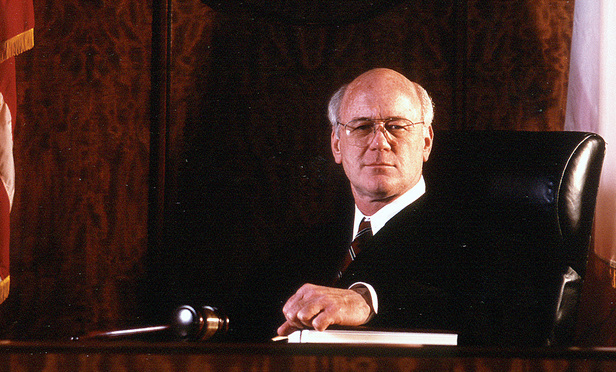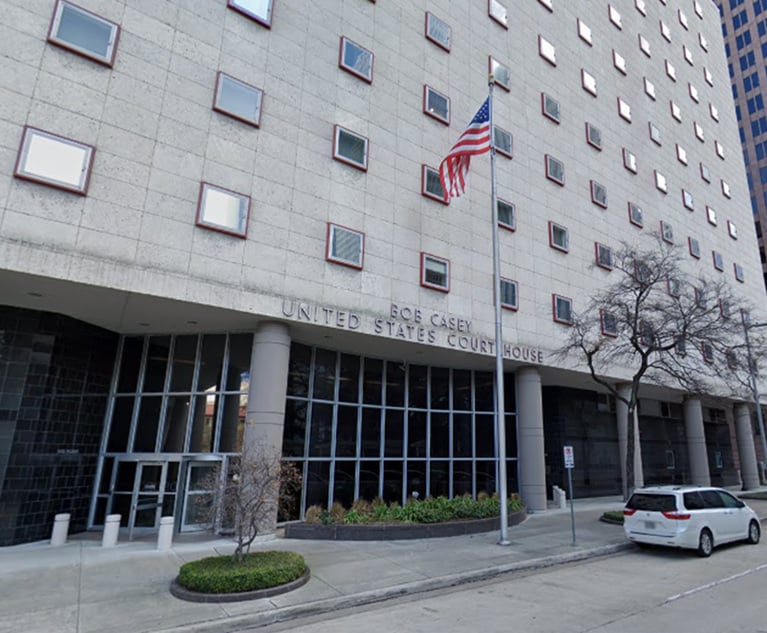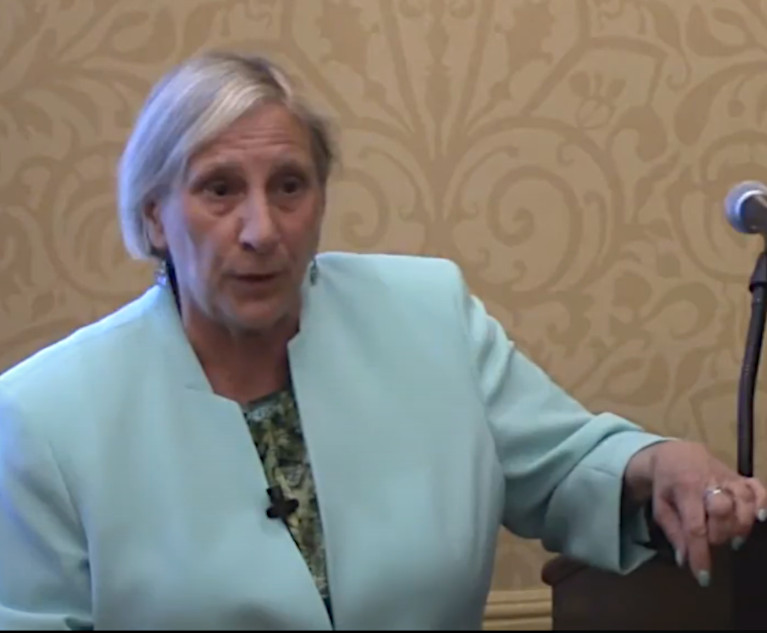Fifth Circuit Orders, And Gets, Ruling on Houston Judge's 9-Year-Old Case
“We recognize that this is a complex matter and district court judges have broad discretion in managing their dockets," the court said. "However, discretion has its limits.”
April 03, 2018 at 02:24 PM
5 minute read
 U.S. District Judge Lynn N. Hughes
U.S. District Judge Lynn N. Hughes In an unusual decision, The U.S. Court of Appeals for the Fifth Circuit has ordered one of Texas' slowest federal judges, U.S. District Judge Lynn Hughes of Houston, to hurry up and rule on a False Claims Act case that has been pending on his docket for over nine years.
And that order had its desired effect as Hughes issued a $30.5 million award to the plaintiffs who had urged him to rule on the case.
Plaintiff Richard Drummond filed a writ of mandamus regarding Hughes with the Fifth Circuit, urging the court to direct Hughes to resolve the qui tam Medicare fraud case Drummond had filed against a medical laboratory company in 2008. Specifically, he asked the Fifth Circuit in October 2017 to force Hughes to rule on three crucial motions for summary judgment that were still pending in the case.
The Fifth Circuit requested a response from Hughes, but no response was received from him, according to the court. However, Hughes did file a response on his own court's docket indicating “this case will come to an end—soon.” More than two months after that decree, he issued an opinion on Dec. 28, 2017, that resolved only one of the three pending summary judgment motions.
And the parties indicated in letter briefs to the Fifth Circuit that the case had not been resolved, and the mandamus action seeking rulings from Hughes was “far from moot.”
In its decision, dated March 23, the Fifth Circuit noted that it can order a trial court judge to issue a ruling via mandamus only if: a petitioner has no other remedy to attain relief; the right to issuing a writ is clear and undisputable; and the issuing court is satisfied that mandamus relief is appropriate under the circumstances.
“In this case, all three requirements are easily met. This case has been pending on the district court's docket for over nine years. Moreover, the two motions identified in the petition have been pending for approximately four years,” the Fifth Circuit wrote in a per curiam opinion. “We recognize that this is a complex matter and district court judges have broad discretion in managing their dockets. However, discretion has its limits.”
“Here, the district judge has had ample time to consider the pending motions—including the nearly six months since Drummond filed this petition for a writ of mandamus. As the Tenth Circuit aptly put it, 'justice delayed is justice denied,'” the Fifth Circuit panel wrote. “The district court's delay in adjudicating this case is simply inexcusable, and this court is left with no other option but to grant mandamus relief.”
The Fifth Circuit concluded its decision by giving Hughes one month to rule on the two remaining summary judgment motions in Drummond's case.
Hughes did not return a call for comment on the mandamus ruling but on Tuesday heeded the circuit court's call, issuing his ruling.
For more than a decade, Hughes has been mentioned in Texas Lawyer's Annual Slowpoke Report, which tracks the number of civil cases pending in Texas federal judges' courts for more than three years, and the number of civil motions pending in their courts for more than six months. While judges typically like to keep those numbers below 10 in both categories, Hughes at the end of 2017 reported 24 civil cases pending for more than three years and 109 civil motions pending for more than six months.
And filing a mandamus against Hughes put Mitchell Kreindler, a Houston attorney who represents Drummond, in a precarious position because he risked angering a judge that had signed a partial judgment order in 2014 that awards both his client and the U.S. Government $10.6 million—money they couldn't recover until Hughes rules on the summary judgment motions and signs a final judgment in the case.
But that move finally paid off after Hughes was prompted to sign a final judgment on April 3—one that dismisses the defendant's summary judgment motions and awards the plaintiffs treble damages totaling $30.5 million.
“We're obviously happy with the ruling—we're happy with the way it came out,” Kreindler said. “I never thought there would be any retribution. Judge Hughes is a jurist that has a lot of integrity. He felt like we did what we needed to do and he did what he needed to do.''
Kreindler said filing the writ was a risky but necessary move.
“It worked out well, and I think Judge Hughes lets litigants do what they need to do,” Kreindler said. “You're always nervous about taking this action—that's why there are so few of them.”
Kreindler also notes in fairness to Hughes that due to the complex nature of qui tam cases, litigation in his client's case didn't get started in earnest until 2011.
Still, Tuesday's ruling might not end the matter if the defendants appeal, Kreindler added.
This content has been archived. It is available through our partners, LexisNexis® and Bloomberg Law.
To view this content, please continue to their sites.
Not a Lexis Subscriber?
Subscribe Now
Not a Bloomberg Law Subscriber?
Subscribe Now
NOT FOR REPRINT
© 2025 ALM Global, LLC, All Rights Reserved. Request academic re-use from www.copyright.com. All other uses, submit a request to [email protected]. For more information visit Asset & Logo Licensing.
You Might Like
View All
JCPenney Seeks Return of More Than $1.1M From Jackson Walker For Bankruptcy Work
3 minute read
HUD Charges Texas HOA With Housing Discrimination in Last Days of Biden Administration
5 minute read
How We Won It: Latham Secures Back-to-Back ITC Patent Wins for California Companies
6 minute read
Federal Judge Approves Harvard's Dismissal of Chip-Patent Suit Against Samsung
2 minute readTrending Stories
Who Got The Work
J. Brugh Lower of Gibbons has entered an appearance for industrial equipment supplier Devco Corporation in a pending trademark infringement lawsuit. The suit, accusing the defendant of selling knock-off Graco products, was filed Dec. 18 in New Jersey District Court by Rivkin Radler on behalf of Graco Inc. and Graco Minnesota. The case, assigned to U.S. District Judge Zahid N. Quraishi, is 3:24-cv-11294, Graco Inc. et al v. Devco Corporation.
Who Got The Work
Rebecca Maller-Stein and Kent A. Yalowitz of Arnold & Porter Kaye Scholer have entered their appearances for Hanaco Venture Capital and its executives, Lior Prosor and David Frankel, in a pending securities lawsuit. The action, filed on Dec. 24 in New York Southern District Court by Zell, Aron & Co. on behalf of Goldeneye Advisors, accuses the defendants of negligently and fraudulently managing the plaintiff's $1 million investment. The case, assigned to U.S. District Judge Vernon S. Broderick, is 1:24-cv-09918, Goldeneye Advisors, LLC v. Hanaco Venture Capital, Ltd. et al.
Who Got The Work
Attorneys from A&O Shearman has stepped in as defense counsel for Toronto-Dominion Bank and other defendants in a pending securities class action. The suit, filed Dec. 11 in New York Southern District Court by Bleichmar Fonti & Auld, accuses the defendants of concealing the bank's 'pervasive' deficiencies in regards to its compliance with the Bank Secrecy Act and the quality of its anti-money laundering controls. The case, assigned to U.S. District Judge Arun Subramanian, is 1:24-cv-09445, Gonzalez v. The Toronto-Dominion Bank et al.
Who Got The Work
Crown Castle International, a Pennsylvania company providing shared communications infrastructure, has turned to Luke D. Wolf of Gordon Rees Scully Mansukhani to fend off a pending breach-of-contract lawsuit. The court action, filed Nov. 25 in Michigan Eastern District Court by Hooper Hathaway PC on behalf of The Town Residences LLC, accuses Crown Castle of failing to transfer approximately $30,000 in utility payments from T-Mobile in breach of a roof-top lease and assignment agreement. The case, assigned to U.S. District Judge Susan K. Declercq, is 2:24-cv-13131, The Town Residences LLC v. T-Mobile US, Inc. et al.
Who Got The Work
Wilfred P. Coronato and Daniel M. Schwartz of McCarter & English have stepped in as defense counsel to Electrolux Home Products Inc. in a pending product liability lawsuit. The court action, filed Nov. 26 in New York Eastern District Court by Poulos Lopiccolo PC and Nagel Rice LLP on behalf of David Stern, alleges that the defendant's refrigerators’ drawers and shelving repeatedly break and fall apart within months after purchase. The case, assigned to U.S. District Judge Joan M. Azrack, is 2:24-cv-08204, Stern v. Electrolux Home Products, Inc.
Featured Firms
Law Offices of Gary Martin Hays & Associates, P.C.
(470) 294-1674
Law Offices of Mark E. Salomone
(857) 444-6468
Smith & Hassler
(713) 739-1250






